Sometime a few years ago, it suddenly became really trendy to have multiple editions of each coin. For example, the US adopted these new state quarters, which are just like the old ones, except each one has the symbols of a particular state on the back. New York, for example, is represented by the Statue of Liberty, while Iowa is represented by a one-room schoolhouse in a cornfield. Connecticut has a tree for some reason that I never really understood, but I guess it is appropriate, as there do seem to be trees in Connecticut. New Hampshire's coin, on the other hand, has a picture of something that it does not posses anymore; the old man in the mountain, a rock formation that fell down a few years ago. I've been away so long that I can't accurately recall the pictures on the other coins, but I can conjure up memories of a banjo, a horse, the outline of New Jersey, and a minuteman with a rifle. New quarters are being issued every ten weeks or so, in the same order that the states entered the union, and lots of people are hoarding little piles of quarters in hopes of collecting all fifty. Just like McDonald's gets kids to get their parents to buy happy meals in order to collect all five plastic Disney toys, the American government gets grown-ups to collect quarters.
And, here in the E.U., a similar phenomenon is taking place with the Euro. While all Euro coins look the same on the front, the backs all have special designs corresponding to the country that they came from. (You can use any Euro coin in any Euro-using country, of course, and in some other places too, like Turkey.)
Here in Greece, the little 1, 2 and 5 cent coins have pictures of boats, while the 10, 20 and 50 cent coins have pictures of important figures in Greek history, one of whom is Eleftherides Venizelos. The one-Euro coin has the Athenian owl, which apparently used to be on the drachma, and the 2-Euro coin has a picture that the Euro website refers to as "the young princess Europa being abducted by Zeus in the shape of a bull." A similar design appears on an ancient coin that can be viewed at the Thessaloniki archeological museum. As a matter of fact, it was a trip to the archeological museum that got me thinking about the picture in the first place.
"Europa abducted by the bull?" I thought to myself. "Wait a minute...wasn't that one of those young women that Zeus raped?" Suddenly my politically-correct brow furrowed and an angry, indignant cry escaped my lips. "You mean to tell me there's a rape scene on my money?" Perhaps I should stop criticizing people who are shocked by Brokeback Mountain and start thinking about the the coins I used to purchase my ticket to said film. I tried to placate myself by reminding myself that Greece actually has money with a picture of woman on it, something that has not yet been seen in the US, unless you count the statue of liberty on the New York state quarter. (Oh yeah, and there are those Sacajawea/Susan B. Anthony dollars too, huh? But apart from the Metro card machines in the NYC subway, nobody seems to actually use those) Ultimately, I still can't quite consider this any great step forward for feminism.
Speaking of women on money, I must make a brief mention of the British two-pound coin, which shows Queen Elizabeth on one side, and a strange, trippy design on the other side that I was never actually able to make sense of. I eventually decided that this mysterious picture was meant to symbolize the tricky nature of the two pound coin itself, which looks small and trivial to American eyes, but is actually worth enough to buy about five ice-cream sundaes in Grinnell, Iowa. (At least, that's how much it was worth when I studied abroad. The changing exchange rate has probably made it worth enough to buy the entire Dari Barn.)
Back to the Euro, I have spent some time perusing the official Euro website (http://http://europa.eu.int/comm/economy_finance/euro/notes_and_coins/coins_images_el_en.htm,) which has pictures of all the coins as well as descriptions of the images that adorn them, and I have come to following conclusions:
-Despite my fuss over the rape scene, I really do like the one-Euro Greek owl coin.
-I like the Spain coins, which have pictures of Cervantes and quills to symbolize the importance of literature. Of course, as everyone keeps reminding me that the financial prospects of an English degree are not great, I am somewhat mystified by the connections between literature and money. (All right, there is a connection if you happen to be, say, J.K. Rowling, but I do not happen to be her.)
-Italy has lovely coins, with pictures of different works of art by Botticelli, Da Vinci, and Michelangelo and a portrait of Dante. I think this is awesome. In fact, come to think of it, the British also have Dickens on their money, don't they? Well, screw it, I don't care if there's no connection between literature and money. I want Walt Whitman and Emily Dickenson on my money. I want coins with Mark Twain and Woody Guthrie on them. I'm sick of looking at grumpy George Washington.
-Finland has a picture of swans flying over the Finnish landscape, and the Austrians have flowers. I like this too. The States should have some more pictures of nature on their coins too. I guess some of the state quarters have natural things on them, but I'm not talking about state quarters. I want a big picture of a moose or a mountain to cover up, say, Alexander Hamilton. This would be a welcome change from having a bunch of politicians cover up Mount Rushmore, which was probably perfectly attractive without unnecessary presidents hacked into it. Or, (in the vein of People and Things Shot By Politicians,) maybe we could have a coin with a picture of Teddy Roosevelt refusing to shoot the chained up bear. I think that would be a very nice image. Does anyone else find it ironic that while Roosevelt refused to shoot the locked-up bear, Dick Cheney purposefully went to shoot the chained-up-quail and shot his hunting partner? Does anyone else feel that this is somehow symbolic?
-Ireland has a Celtic harp on their money. I think it is very pretty.
-Vatican City apparently used to have pictures of John Paul II on their money, but soon they are going to have the new guy, whose name I still do not remember. I do find it somewhat strange to find religious leaders on money, but the Vatican is a religous state. Of course, this religious state does not have 'In God We Trust' on their money. The United States, a secular nation founded by people seeking religious freedom, does. On the other hand, the 'God' in the aforementioned phrase is presumably not in the process of carrying a young woman away in order to molest her.
Now that I have used this discussion of money to thoroughly bash the United States from every possible angle, I am going to go take a shower, eat Greek salad for lunch, and daydream about used bookstores, Central Park and barbecue. I really don't hate America. It just frustrates me sometimes.
Wednesday, March 22, 2006
Tuesday, March 21, 2006
Sorry, Can't Help You
It's always interesting to see which google searches cause my blog to pop up. A lot of people get here just by typing 'Greece' into blogsearch, and some get here with queries regarding the name 'Emily' in Greek. I also get a fair number of people looking for "we are happy to serve you" mugs, Emily the Strange brand clothing, and, of course, cat passports. However, these two recent hits have got to be the best ones I have seen in a while:
"Harry Potter themed alcoholic drinks"
and
"Why Greeks think you can catch a cold from going out with wet hair"
Fantastic. Unfortunately, I have no information for either person.
"Harry Potter themed alcoholic drinks"
and
"Why Greeks think you can catch a cold from going out with wet hair"
Fantastic. Unfortunately, I have no information for either person.
Wednesday, March 15, 2006
A Socially Relevant Interlude Between Sandwiches
International Women's Day was last week sometime, and apparently there was a movement to blog about women's issues issues for a day. Well, between American holidays and the various Greek festivals, I have enough to keep track of, and didn't really notice International Women's Day until it was kind of late. However, I do feel a little bad about the fact that, given a good opportunity to discuss issues of social relevance, I chose to write about sandwiches.
(All right, I don't feel that bad after all. I really like sandwiches. However, I've now exhausted that topic, so here it comes; the Social Issues Post. You knew it was coming. I went to Grinnell, after all.)
This is about gender, but not about women. See, I saw Brokeback Mountain a couple of weeks ago, at a theatre in downtown Thessaloniki. The place was about half full. All was quiet for the first forty minutes or so; until the first sex scene. At the moment the two cowboys started, well, getting intimate, this audible gasp and murmur rose from the crowd, and didn't subside until the camera had returned to grazing sheep and mountain streams and whatnot. Now, I understand that watching sex scenes is not always the most comfortable experience, and sex scenes between men are few and far between in Hollywood films. But the whole thing got me thinking about homosexuality in Greece, which is something of a puzzle to me.
On the one hand, Greece is the land of Achilles and Patroclus, Alexander the Great, and Sappho. On the other hand, I've noticed that some modern Greeks are not exactly as gay-friendly as their ancestors. It's not that people here are hateful towards gays, they just seem to regard homosexuality as something, well, weird. My interpretation is that, to Greeks, same-sex relationships are kind of like eating a nutella and mayonaise sandwich. It's not a crime, it's just, well, strange, and vaguely distasteful.
I was talking to an eight grade dorm student the other day, asking him what movies he likes. "I just saw Alexander," he said. "It was pretty good, but the filmmakers changed some things from the history."
"Oh yeah?" I said. "Well, movies do that a lot. What did they change?"
"Well," said the eighth grader, "They showed a man kissing Alexander!"
"Uh," I said. "I think that actually happened."
He gave me the sort of look I might give you if you told me that Abraham Lincoln was a drag queen. It wasn't defensive look, or an offended one, just a what-are-you-talking-about look. "No," he said. "That didn't happen." I let the subject drop.
And then there was the Greek acquaintance of mine who once explained to me that "Men eat meat. If a guy just eats a lot of vegetables, well, then he's gay." I raised my eyebrows at this, and explained that a lot of people, including my boyfriend, would be very interested to hear this. "Well" said my friend. "Maybe it's not true for American men. But it's true for Greeks." Recently the same friend snickered at the sight of a Brokeback Mountain poster and told me "I could never see that movie. Gay cowboys? I would just laugh through the whole thing."
Of course, I am definitely not suggesting that all Greeks are homophobic, or that all Americans are completely gay friendly. In fact, there seem to be a lot of Americans who are more openly hateful towards gays than I have ever seen any Greek become. I'm sure a lot of Americans reacted pretty strongly to the aformentioned scenes in Brokeback Mountain. I'm sure plenty of them did a lot more than gasp. And when it comes to blatant insensitivity, how can I forget an American acquaintance of mine who repeatedly referred to everyone and everything that she did not personally care for as "gay." At one point, she actually told me "My father won't let me use the car. He's being totally gay about it." I didn't know whether to laugh, cry, or enquire as to which adoption agency had brought her family together.
I guess I just want to know why I heard gasps of shock during a male sex scene, but no aubible reaction whatsoever when George Clooney got his fingernails pulled out during Syriana, or when several people were gunned down in cold blood during Match Point. And, speaking of cold blood, I didn't hear much of a reaction during the opening scene of Capote, when a teenage girl was discovered murdered in her bed, with blood spattered all over the wall. We're used to seeing this things on film, I guess. But sex between men? Shocking!
So homophobia exists everywhere, I guess, and maybe it's not fair of me to gauge the Greek attitude towards homosexuality through the lens of American movies. I just can't quite pin down the Greek attitudes, which are slightly different than the American ones. There's no Fred Phelps here. But there's no gay pride parade either. (At least, if there is, I haven't heard about it.) In any case, I'm glad I felt out the territory before I was asked to teach any more Walt Whitman.
(All right, I don't feel that bad after all. I really like sandwiches. However, I've now exhausted that topic, so here it comes; the Social Issues Post. You knew it was coming. I went to Grinnell, after all.)
This is about gender, but not about women. See, I saw Brokeback Mountain a couple of weeks ago, at a theatre in downtown Thessaloniki. The place was about half full. All was quiet for the first forty minutes or so; until the first sex scene. At the moment the two cowboys started, well, getting intimate, this audible gasp and murmur rose from the crowd, and didn't subside until the camera had returned to grazing sheep and mountain streams and whatnot. Now, I understand that watching sex scenes is not always the most comfortable experience, and sex scenes between men are few and far between in Hollywood films. But the whole thing got me thinking about homosexuality in Greece, which is something of a puzzle to me.
On the one hand, Greece is the land of Achilles and Patroclus, Alexander the Great, and Sappho. On the other hand, I've noticed that some modern Greeks are not exactly as gay-friendly as their ancestors. It's not that people here are hateful towards gays, they just seem to regard homosexuality as something, well, weird. My interpretation is that, to Greeks, same-sex relationships are kind of like eating a nutella and mayonaise sandwich. It's not a crime, it's just, well, strange, and vaguely distasteful.
I was talking to an eight grade dorm student the other day, asking him what movies he likes. "I just saw Alexander," he said. "It was pretty good, but the filmmakers changed some things from the history."
"Oh yeah?" I said. "Well, movies do that a lot. What did they change?"
"Well," said the eighth grader, "They showed a man kissing Alexander!"
"Uh," I said. "I think that actually happened."
He gave me the sort of look I might give you if you told me that Abraham Lincoln was a drag queen. It wasn't defensive look, or an offended one, just a what-are-you-talking-about look. "No," he said. "That didn't happen." I let the subject drop.
And then there was the Greek acquaintance of mine who once explained to me that "Men eat meat. If a guy just eats a lot of vegetables, well, then he's gay." I raised my eyebrows at this, and explained that a lot of people, including my boyfriend, would be very interested to hear this. "Well" said my friend. "Maybe it's not true for American men. But it's true for Greeks." Recently the same friend snickered at the sight of a Brokeback Mountain poster and told me "I could never see that movie. Gay cowboys? I would just laugh through the whole thing."
Of course, I am definitely not suggesting that all Greeks are homophobic, or that all Americans are completely gay friendly. In fact, there seem to be a lot of Americans who are more openly hateful towards gays than I have ever seen any Greek become. I'm sure a lot of Americans reacted pretty strongly to the aformentioned scenes in Brokeback Mountain. I'm sure plenty of them did a lot more than gasp. And when it comes to blatant insensitivity, how can I forget an American acquaintance of mine who repeatedly referred to everyone and everything that she did not personally care for as "gay." At one point, she actually told me "My father won't let me use the car. He's being totally gay about it." I didn't know whether to laugh, cry, or enquire as to which adoption agency had brought her family together.
I guess I just want to know why I heard gasps of shock during a male sex scene, but no aubible reaction whatsoever when George Clooney got his fingernails pulled out during Syriana, or when several people were gunned down in cold blood during Match Point. And, speaking of cold blood, I didn't hear much of a reaction during the opening scene of Capote, when a teenage girl was discovered murdered in her bed, with blood spattered all over the wall. We're used to seeing this things on film, I guess. But sex between men? Shocking!
So homophobia exists everywhere, I guess, and maybe it's not fair of me to gauge the Greek attitude towards homosexuality through the lens of American movies. I just can't quite pin down the Greek attitudes, which are slightly different than the American ones. There's no Fred Phelps here. But there's no gay pride parade either. (At least, if there is, I haven't heard about it.) In any case, I'm glad I felt out the territory before I was asked to teach any more Walt Whitman.
Tuesday, March 07, 2006
Feta and Peppers, please, hold the mayo
It's been awhile since I've made one of my Greek food posts. This is strange, as eating is one of my favorite activities.
Greece is peppered with places that sell food to go; I've already discussed pites. However, there are also a large number of places that sell sandwiches and crepes as an alternative to pites or bougatsa. Each of these lunch/snack shops has a big display of various sandwich fillings, from tomatoes, mushrooms, olives and peppers to various meats, and cheeses. You order the fillings you want, and watch them either get piled into a sandwich which may or may not be toasted, or placed on top of a frying crepe. I should explain that in Greece, the word 'toast' does not indicate toasted bread with jam and/or butter, it refers to toasted sandwiches, similar to panini. Crepes can be filled with sandwich fillings as well, or with sweet stuff like Nutella and nuts, for dessert. Just about every American I know in Greece has become completely enamored of Greek crepes. Part of the appeal is that you get to watch the crepe batter get spread out over the crepe pan with a little crepe spatula, and then watch the whole thing get flipped over and the ingredients piled on top before it's folded into a sandwich-like triangle.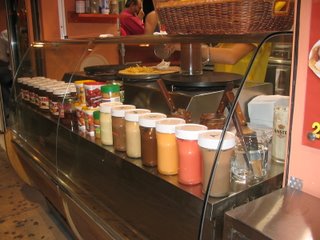 Working in a crepe shop looks really fun. In reality, it is probably fun for the first day or so, and then you reach the point where it's dull, and then you reach the point where you find yourself flipping crepes in your dreams, and soon you never want to flip a damn crepe again. However, since it's not my job, I think it looks fun.
Working in a crepe shop looks really fun. In reality, it is probably fun for the first day or so, and then you reach the point where it's dull, and then you reach the point where you find yourself flipping crepes in your dreams, and soon you never want to flip a damn crepe again. However, since it's not my job, I think it looks fun.
Here are some of my favorite toast/sandwich/crepe ingredients:
Cheese:
Feta
This should be obvious. Feta is the Greek staple. It's everywhere; on sandwiches, crepes, in salads of all kinds, in slabs next to my cafeteria dinner, crumbled over stuffed vegetables, etc. I love the stuff. I always have had a fondness for feta, even before I came to Greece. Actually, though I am hardly a cheese connoisseur (or, for that matter, a connoisseuse) I think I am generally fond cheeses of the mediterranean region, and when I say "mediterranean region", I mean Greece and Italy. I know some people are crazy about brie, but I personally have never been able to work up much enthusiasm for it. It seems so thick, and sort of gluey when you melt it, and I don't know; I'm just not sure what all the fuss is about. Maybe I've never had good brie. In any case, though I have had some really good Gouda and cheddar, I think I prefer feta. It's nice and soft, fresh, crumbly, salty, and has a strong but not unpleasantly strong taste. I also think real parmigiana makes everything taste better, and oh-my-god there is nothing like real fresh mozzarella. But, I digress.
Manouri
I hadn't heard of this stuff before I came to Greece. In fact, I hadn't really tried it until a few weeks ago. But it's good. It's white and a littler softer and creamier than feta. It's also a little less crumbly and a little less sharp. It's really good on sandwiches with cucumbers and paprika sauce. (See below)
Salads:
I'm not referring to the quintessential Greek salad or green salad here; I'm talking about sandwich spreads or dipping sauces, which are referred to in Greek as 'salates'. Every sandwich shop has an array of salads to choose from, and there are even more available in tavernas.
Tzatziki
This is pretty much the classic Greek dipping sauce. Yogurt, garlic, cucumber, dill, and olive oil. It's creamy and delicious. I have yet to meet anyone who doesn't like it. Of course, tzatziki is not really so much a toast/crepe filling as it is a taverna appetizer, or a gyro topping, but I do know of several places that offer it on crepes.
Tirosalata (aka Ktipiti)
This one is new to most Americans; it's a sort of dip made of some combination of some or all of the following ingredients; smushed up feta, hot peppers, yogurt, olive oil, red peppers. Every place seems to have their own slight variation of tirosalata (which literally means "cheese salad"). However, it's almost always really damn good. In fact, pretty much everyone who has visited me thus far has developed an affinity for it. It can also be referred to as ktipiti, whichI have been told is a word that is in some way related to the Greek verb "to smush", because that's what is done to the feta.
Melitzanosalata
OK, this is really not a sandwich topping most of the time. It's made of smushed up roasted eggplants ('melitzanes'), and it's yummy. Some people also put mayonaise in it. I prefer the non-mayonaise version, as I generally find mayo to be less than appetizing. However, I have always had a particular fondness for eggplant. (Combined with similar particular fondnessess for yogurt and feta, it seems I was destined to spend time in Greece.)
Taramosalata
This is not a sandwich topping either, it's really something you eat with bread at a meal. It is a salad, however. A salad made of fish eggs. It's princess pink, the exact sort of color that a lot of little girls were wearing at Carnival. It tastes creamy and slightly, well, fishy. But not fishy in a gross, overly-ripe seafood way, just fishy enough to let you know that it's made from fish eggs. It's the only caviar I've ever tried, and I confess that the idea of eating fish eggs is a little bit strange to me. I don't know why, as I have been eating chicken eggs for a number of years now without any sort of squeamishness. In any case, it's not strange enough to keep me from eating it, just strange enough that whenever I do eat it, there's a tiny little voice in the back of my head saying "You're eating fish eggs. Those are fish eggs. FISH EGGS. FISH EGGS. FISH EGGS." This is the reason that I don't eat a lot of taramosalata, even though it tastes good.
Paprika
I discovered this stuff very recently, and I have only tried it once, but I plan to increase that number. Paprika sauce is a reddish spread, that I always assumed was made with Paprika, the spice that one uses for deviled eggs. As it turns out, it's made from ground up red peppers, tomato, mustard, and spices. Also listed under the ingredients on my package of it is "sauce". The Greeks seem to use the word "sauce" to refer only to some of the things that I would consider sauces; a Greek friend tells me that in Greek, something is a 'sauce' only if it includes tomato or cream. So basically, I really don't know what the word 'sauce' refers to on a list of ingredients, and I hope it doesn't refer to mayo or more fish eggs, but it doesn't really matter because the paprika salad is really yummy.
Rossiki, or Russian Salad
I've got to be honest. I don't really like this stuff. It's boiled vegetables (carrots, potatoes, peas) in mayonaise, and maybe yogurt. It's too much mayo for me, personally. I only like mayo in very small amounts. However, a lot of people really like Russian salad, and there are a lot of other, similar mayo based salads that I am unfamiliar with. I think there's one called Hungarian salad, and some others that I don't know the names of. They include things like ham, mushrooms, vegetables, and I don't know what else. If you're interested, you'll have to find a mayo lover to explain all this to you.
My final word on the subject is, sauces and salads are important. I know this, personally, as I have taken to bringing my own salad dressing to the cafeteria (the same old oil and vinegar gets dull after a while) and slathering my own paprika salad on the cafeteria sandwiches. This has improved the happiness of my taste buds by approximately 47%.
I was going to take a picture of some Greek foods for you, but my camera was unfortunately knocked off of my dresser last night by my cat, and now it's being dysfunctional. Anyone know a good camera repair shop in Thessaloniki?
Greece is peppered with places that sell food to go; I've already discussed pites. However, there are also a large number of places that sell sandwiches and crepes as an alternative to pites or bougatsa. Each of these lunch/snack shops has a big display of various sandwich fillings, from tomatoes, mushrooms, olives and peppers to various meats, and cheeses. You order the fillings you want, and watch them either get piled into a sandwich which may or may not be toasted, or placed on top of a frying crepe. I should explain that in Greece, the word 'toast' does not indicate toasted bread with jam and/or butter, it refers to toasted sandwiches, similar to panini. Crepes can be filled with sandwich fillings as well, or with sweet stuff like Nutella and nuts, for dessert. Just about every American I know in Greece has become completely enamored of Greek crepes. Part of the appeal is that you get to watch the crepe batter get spread out over the crepe pan with a little crepe spatula, and then watch the whole thing get flipped over and the ingredients piled on top before it's folded into a sandwich-like triangle.
 Working in a crepe shop looks really fun. In reality, it is probably fun for the first day or so, and then you reach the point where it's dull, and then you reach the point where you find yourself flipping crepes in your dreams, and soon you never want to flip a damn crepe again. However, since it's not my job, I think it looks fun.
Working in a crepe shop looks really fun. In reality, it is probably fun for the first day or so, and then you reach the point where it's dull, and then you reach the point where you find yourself flipping crepes in your dreams, and soon you never want to flip a damn crepe again. However, since it's not my job, I think it looks fun.Here are some of my favorite toast/sandwich/crepe ingredients:
Cheese:
Feta
This should be obvious. Feta is the Greek staple. It's everywhere; on sandwiches, crepes, in salads of all kinds, in slabs next to my cafeteria dinner, crumbled over stuffed vegetables, etc. I love the stuff. I always have had a fondness for feta, even before I came to Greece. Actually, though I am hardly a cheese connoisseur (or, for that matter, a connoisseuse) I think I am generally fond cheeses of the mediterranean region, and when I say "mediterranean region", I mean Greece and Italy. I know some people are crazy about brie, but I personally have never been able to work up much enthusiasm for it. It seems so thick, and sort of gluey when you melt it, and I don't know; I'm just not sure what all the fuss is about. Maybe I've never had good brie. In any case, though I have had some really good Gouda and cheddar, I think I prefer feta. It's nice and soft, fresh, crumbly, salty, and has a strong but not unpleasantly strong taste. I also think real parmigiana makes everything taste better, and oh-my-god there is nothing like real fresh mozzarella. But, I digress.
Manouri
I hadn't heard of this stuff before I came to Greece. In fact, I hadn't really tried it until a few weeks ago. But it's good. It's white and a littler softer and creamier than feta. It's also a little less crumbly and a little less sharp. It's really good on sandwiches with cucumbers and paprika sauce. (See below)
Salads:
I'm not referring to the quintessential Greek salad or green salad here; I'm talking about sandwich spreads or dipping sauces, which are referred to in Greek as 'salates'. Every sandwich shop has an array of salads to choose from, and there are even more available in tavernas.
Tzatziki
This is pretty much the classic Greek dipping sauce. Yogurt, garlic, cucumber, dill, and olive oil. It's creamy and delicious. I have yet to meet anyone who doesn't like it. Of course, tzatziki is not really so much a toast/crepe filling as it is a taverna appetizer, or a gyro topping, but I do know of several places that offer it on crepes.
Tirosalata (aka Ktipiti)
This one is new to most Americans; it's a sort of dip made of some combination of some or all of the following ingredients; smushed up feta, hot peppers, yogurt, olive oil, red peppers. Every place seems to have their own slight variation of tirosalata (which literally means "cheese salad"). However, it's almost always really damn good. In fact, pretty much everyone who has visited me thus far has developed an affinity for it. It can also be referred to as ktipiti, whichI have been told is a word that is in some way related to the Greek verb "to smush", because that's what is done to the feta.
Melitzanosalata
OK, this is really not a sandwich topping most of the time. It's made of smushed up roasted eggplants ('melitzanes'), and it's yummy. Some people also put mayonaise in it. I prefer the non-mayonaise version, as I generally find mayo to be less than appetizing. However, I have always had a particular fondness for eggplant. (Combined with similar particular fondnessess for yogurt and feta, it seems I was destined to spend time in Greece.)
Taramosalata
This is not a sandwich topping either, it's really something you eat with bread at a meal. It is a salad, however. A salad made of fish eggs. It's princess pink, the exact sort of color that a lot of little girls were wearing at Carnival. It tastes creamy and slightly, well, fishy. But not fishy in a gross, overly-ripe seafood way, just fishy enough to let you know that it's made from fish eggs. It's the only caviar I've ever tried, and I confess that the idea of eating fish eggs is a little bit strange to me. I don't know why, as I have been eating chicken eggs for a number of years now without any sort of squeamishness. In any case, it's not strange enough to keep me from eating it, just strange enough that whenever I do eat it, there's a tiny little voice in the back of my head saying "You're eating fish eggs. Those are fish eggs. FISH EGGS. FISH EGGS. FISH EGGS." This is the reason that I don't eat a lot of taramosalata, even though it tastes good.
Paprika
I discovered this stuff very recently, and I have only tried it once, but I plan to increase that number. Paprika sauce is a reddish spread, that I always assumed was made with Paprika, the spice that one uses for deviled eggs. As it turns out, it's made from ground up red peppers, tomato, mustard, and spices. Also listed under the ingredients on my package of it is "sauce". The Greeks seem to use the word "sauce" to refer only to some of the things that I would consider sauces; a Greek friend tells me that in Greek, something is a 'sauce' only if it includes tomato or cream. So basically, I really don't know what the word 'sauce' refers to on a list of ingredients, and I hope it doesn't refer to mayo or more fish eggs, but it doesn't really matter because the paprika salad is really yummy.
Rossiki, or Russian Salad
I've got to be honest. I don't really like this stuff. It's boiled vegetables (carrots, potatoes, peas) in mayonaise, and maybe yogurt. It's too much mayo for me, personally. I only like mayo in very small amounts. However, a lot of people really like Russian salad, and there are a lot of other, similar mayo based salads that I am unfamiliar with. I think there's one called Hungarian salad, and some others that I don't know the names of. They include things like ham, mushrooms, vegetables, and I don't know what else. If you're interested, you'll have to find a mayo lover to explain all this to you.
My final word on the subject is, sauces and salads are important. I know this, personally, as I have taken to bringing my own salad dressing to the cafeteria (the same old oil and vinegar gets dull after a while) and slathering my own paprika salad on the cafeteria sandwiches. This has improved the happiness of my taste buds by approximately 47%.
I was going to take a picture of some Greek foods for you, but my camera was unfortunately knocked off of my dresser last night by my cat, and now it's being dysfunctional. Anyone know a good camera repair shop in Thessaloniki?
Monday, March 06, 2006
More Carnival Excitement
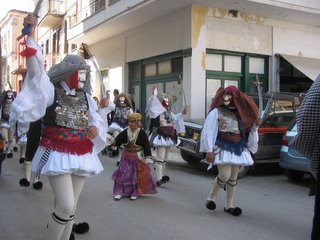

Sunday was the end of carnival, a massive party day when all of Greece gathers together to celebrate eating vegetables for the next six weeks or so. At least, that's what I, the Not-Quite-Vegetarian, was celebrating. (I do eat meat, but as my friend Will put it, "not in Greek portions.") Everyone else was celebrating the beginning of the Greek Lent, which commences today, Clean Monday. OK, I don't know if "celebrating" is really the right word for what one does on Clean Monday. "Having fun while we still can" might be a better way to sum it up. But in any case, it was an enjoyable day.
I took a trip to nearby Naoussa with some friends to see
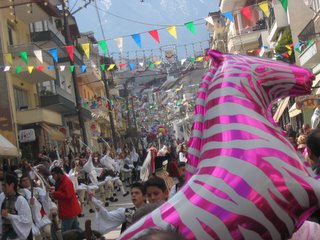 the action, which took the form of several parades and lots of dancing, eating, throwing of confetti, and playing of music. There were people dressed up in anything, masquerading as anything and everything. It ranged from traditional costumes to cowboy outfits, Roman soldier uniforms, witches, aliens, Zorros, clowns, and of course, for the vast majority of girls under the age of ten, poufy dresses.
the action, which took the form of several parades and lots of dancing, eating, throwing of confetti, and playing of music. There were people dressed up in anything, masquerading as anything and everything. It ranged from traditional costumes to cowboy outfits, Roman soldier uniforms, witches, aliens, Zorros, clowns, and of course, for the vast majority of girls under the age of ten, poufy dresses.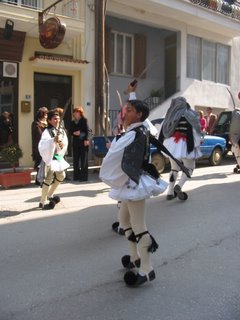
The Naoussa parade is mock wedding procession led by lots of boys and young men in costume, with swords, dancing and escorting the "bride" to the church. There were several of these processions, each similar, but with some variation. The "bride" was, in some cases, played by little girls, and in other cases, played by men in masks and drag. In each case, (s) he was waving a white handkerchief, presumably as a sign of purity. Below, I've posted several pictures of brides, each one flanked by an army of escorts, all of whom were dancing and mock sword-fighting.
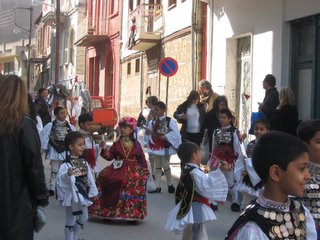

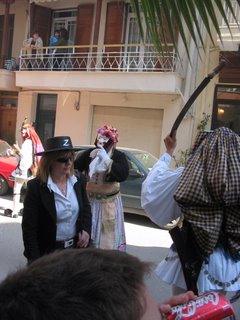
I hear that this parade originated as pagan tradition, and was adopted into the Easter calendar way back when. Actually, I have heard rumors that pagan fertility festivals were converted into Easter celebrations in a lot of places. After all, eggs are symbols of fertility, and they don't seem to have a lot to do with Jesus.
The parades were quite a spectacle, but they were only part of it. In every square of the town, people seemed to be gathered, dancing while bands played a sort of balkan influenced music- maybe gypsy music, but I am not sure. We (by 'we' I mean myself, co-Grinnell-fellow Brad, former Grinnell fellow Will and Will's mother) wandered around for a while, watching the bands play and people dance, ate souvlaki, had mezedes and tsipouro at a kafenio, and generally soaked up the Carnival excitement. The entire town seemed to be packed; every cafe was full, every taverna was filled with revelers, and there seemed to be people dancing in every plateia, or square. Actually, a lot of them were just sort of dancing through regular intersections. It was fun to see people in army fatigues holding hands with hippies, who were holding hands with people in traditional costume, who were holding hands with witches, while all of them danced in a big circle.
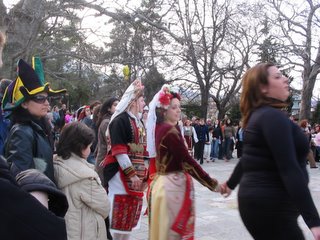
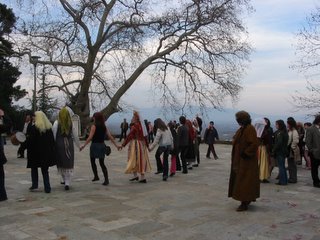
As the celebration became slightly more subdued, we wandered a bit through Naoussa, which is located in the mountains, and admired the scenery, which included some lovely waterfalls and some really nice views, like this one:
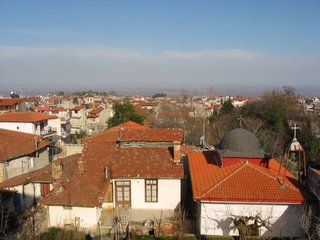 We ended the day by purchasing local fruit (I just love that it is strawberry season in Greece. Who would expect strawberries in early March?) and watching the sun set from the square in front of a local church.
We ended the day by purchasing local fruit (I just love that it is strawberry season in Greece. Who would expect strawberries in early March?) and watching the sun set from the square in front of a local church. And now, it's time for fasting. Bring on the beans!
And now, it's time for fasting. Bring on the beans!
Wednesday, March 01, 2006
The Bus System Stikes Back
Yesterday at about 3:45, I went to the bus stop. I was planning to go downtown, just for a change of scenery and maybe to do some shopping at the market. Based on the bus schedule, it looked like there would be a bus arriving at 4:00 or so.
At 4:00, there was no bus.
At 4:15, there was no bus.
At 5:00pm, there was still no bus, and there was a huge crowd of people standing around at the stop, looking increasingly disgruntled.
At 5:05, some students from the International School came by, discussing the fact that apparently, there was a bus strike on. Well, I guess I should have figured that out after 20 or 30 minutes of waiting, but somehow I didn't. I just figured that since all of those people were waiting for the bus, it must be coming. After all, they are presumably more capable of reading the Greek news than I am, and would be more likely to hear about a strike.
So I walked into Pylea, our local town, and did some shopping there. Unfortunately, on the way back, I ran into an old friend of mine known as Πολυ Μεγαλοσ Σκυλοσ, or Very Big Dog. Very Big Dog appears sometimes on the road between Pylea and Anatolia, and he barks and snarls, and once even chased me for several blocks, growling and yipping and making all sorts of menacing noises. I realize that, like many dogs, his bark may be worse than his bite. But I do not really want to investigate the matter personally. I'd rather just steer clear of either.
Unfortunately for me, there were only two ways back to school that I knew of:
a) Walk Past Big Scary Dog.
b)Take the bus
Luckily, I discovered another possibility:
c) Walk along the highway and pray that cars will not hit me.
Sometimes I really, really, hate that damn bus. Especially when it's not there.
At 4:00, there was no bus.
At 4:15, there was no bus.
At 5:00pm, there was still no bus, and there was a huge crowd of people standing around at the stop, looking increasingly disgruntled.
At 5:05, some students from the International School came by, discussing the fact that apparently, there was a bus strike on. Well, I guess I should have figured that out after 20 or 30 minutes of waiting, but somehow I didn't. I just figured that since all of those people were waiting for the bus, it must be coming. After all, they are presumably more capable of reading the Greek news than I am, and would be more likely to hear about a strike.
So I walked into Pylea, our local town, and did some shopping there. Unfortunately, on the way back, I ran into an old friend of mine known as Πολυ Μεγαλοσ Σκυλοσ, or Very Big Dog. Very Big Dog appears sometimes on the road between Pylea and Anatolia, and he barks and snarls, and once even chased me for several blocks, growling and yipping and making all sorts of menacing noises. I realize that, like many dogs, his bark may be worse than his bite. But I do not really want to investigate the matter personally. I'd rather just steer clear of either.
Unfortunately for me, there were only two ways back to school that I knew of:
a) Walk Past Big Scary Dog.
b)Take the bus
Luckily, I discovered another possibility:
c) Walk along the highway and pray that cars will not hit me.
Sometimes I really, really, hate that damn bus. Especially when it's not there.
Subscribe to:
Comments (Atom)

